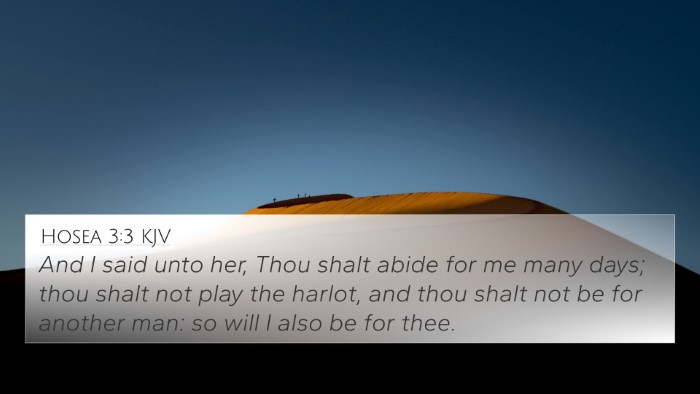Understanding 1 Corinthians 7:4
1 Corinthians 7:4 states, "The wife does not have authority over her own body, but the husband does; and likewise the husband does not have authority over his own body, but the wife does." This verse highlights the mutual rights and responsibilities within the context of marriage, indicating an essential principle of marital intimacy and the joint stewardship of one's body.
Exegesis and Analysis
The Apostle Paul addresses the dynamics of marital relationships in this chapter. Here, the emphasis is on mutual submission, which is a central theme in the Christian understanding of marriage. Both partners are invited to recognize and respect each other's needs and rights.
Insights from Commentaries
-
Matthew Henry:
Henry emphasizes that this passage serves to portray the equality in the marital relationship. This equality is critical, as each partner must honor the other. He notes that the authority mentioned here should not be viewed as control but rather as a loving and respectful giving of oneself to the other.
-
Albert Barnes:
Barnes interprets this verse as an essential guideline for married couples. He states that each partner's body belongs to the other, suggesting that intimacy is not merely a physical act but an integration of emotional and spiritual bonds that must be nurtured through mutual consent and love.
-
Adam Clarke:
Clarke focuses on the implications of this mutual ownership. He asserts that the verse articulates a profound truth about the shared life of married individuals, highlighting the need for a selfless, giving attitude towards one another, especially concerning physical intimacy.
Bible Cross References
Understanding 1 Corinthians 7:4 benefits from cross-referencing with other biblical texts that delve into similar themes. Here are some related verses:
- Genesis 2:24: "Therefore a man shall leave his father and mother and be joined to his wife, and they shall become one flesh." This verse establishes the foundational principle of unity in marriage.
- Ephesians 5:21: "Submitting to one another in the fear of God." This verse underscores the idea of mutual submission within the marriage relationship.
- 1 Peter 3:7: "Husbands, likewise, dwell with them with understanding, giving honor to the wife." This passage stresses the importance of honoring one another in marriage.
- 1 Corinthians 7:3: "Let the husband render to his wife the affection due her, and likewise also the wife to her husband." This reinforces the mutual obligation to provide emotional and physical support.
- Hebrews 13:4: "Marriage is honorable among all, and the bed undefiled." This indicates the sanctity of the marital relationship, validating intimacy as part of that sanctity.
- Song of Solomon 2:16: "My beloved is mine, and I am his." This romantic imagery further supports the notion of shared life and love.
- Colossians 3:18-19: "Wives, submit to your own husbands, as is fitting in the Lord. Husbands, love your wives and do not be bitter toward them." This passage provides insight into the roles within marriage based on love and respect.
Application and Reflection
This verse serves as a reminder that marriage is a partnership built on mutual respect and love. The implications of sharing authority over one another's bodies elevate the call to selflessness in relationships, urging couples to care for each other's physical and emotional needs.
Thematic Connections
The themes of mutual submission, shared authority, and respectful love resonate throughout the Scriptures. By examining these themes across various passages, we cultivate a deeper understanding of the biblical worldview surrounding marriage.
Tools for Bible Cross-Referencing
To further explore the connections between biblical texts, consider using the following tools:
- Bible Concordance: A comprehensive index that helps identify keywords and their occurrences across the scriptures.
- Bible Cross-Reference Guide: A resource that outlines thematic relationships between verses, aiding in deeper studies.
- Cross-Reference Bible Study: Methods and practices for engaging with scripture that highlight connections between verses.
- Bible Reference Resources: Various printed or digital resources designed to aid in locating cross-references effectively.
Conclusion
In summary, 1 Corinthians 7:4 calls for a profound respect for one another in the marital context, respecting the needs, desires, and rights of both partners. Through cross-referencing and thematic analysis, one can explore the richness of biblical teachings on marriage and intimacy, positioning this verse within a broader scriptural conversation about love, unity, and mutual care.





